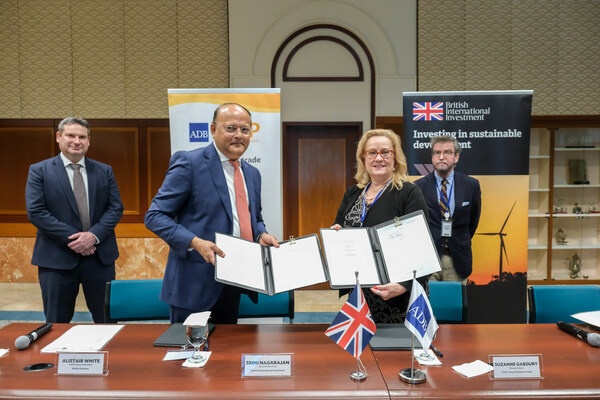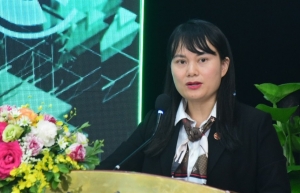$100m risk sharing agreement to promote green trade in Asia
 |
The partnership will be managed through ADB's Trade and Supply Chain Finance Programme (TSCFP) and will focus on renewable energy, energy efficiency, and climate-smart agriculture to support the region's energy transition and climate resilience.
In South and Southeast Asia, two of the most vulnerable areas to climate change, enabling the development of more renewable energy capacity is essential to achieving the region's sustainability goals.
Trade is a critical part of this, as it enables the flow of goods that help regions to mitigate and adapt to the impacts of climate change. However, it is estimated that there is a global trade finance gap of $2.5 trillion annually, which means businesses lack access to the finance needed to trade energy transition goods for climate projects.
Furthermore, local banks cannot fully meet the demands for the longer tenors that are required to finance climate related projects, particularly within the renewable energy sector.
The BII-ADB partnership aims to reduce this gap and address the unmet demand for longer loan periods for green transactions. The risk sharing agreement between the two organisations will help international banks increase their financing support to local banks, initially in Vietnam, before expanding to other countries supported by BII and the ADB.
This will provide crucial financing for local importers of solar panels, wind turbines, electric vehicles, and agricultural goods, which will support the region to transition to cleaner sources of energy.
Srini Nagarajan, managing director and head of Asia at BII commented, "Supporting sustainable development in South and Southeast Asia is a key priority at BII. Green trade finance enables supply chain development of the renewable energy industry and tackles the bottleneck for much-needed long tenor financing in the region. We are delighted to work with the ADB, a strong partner with extensive knowledge and a strong network in Asia, on a shared ambition to support the region's energy transition and build climate resilience."
Suzanne Gaboury, director general for Private Sector Operations at the ADB said, "This collaboration with BII will strengthen the capacity of the ADB's TSCFP to further grow green supply chains in the Asia-Pacific region, with a focus on energy transition goods that are essential for tackling climate change."
The BII-ADB Green Trade Finance Facility supports the UN's Sustainable Development Goal (SDG) 7 on affordable and clean energy and SDG 13 on climate action. The transaction was led by Freddie Tucker, investment director of Trade and Supply Chain Finance at BII.
 | Green finance must be unlocked to develop The banking sector has been urged to unlock viable green finance to attract a broader investor base to facilitate its green transition. |
 | Agribank's green finance initiative: Catalysing Vietnam's eco-friendly economic ascent At the forefront of Vietnam's green finance revolution, Agribank has reported a substantial green credit portfolio of approximately $510 million as of October 31. This revelation came from Phung Thi Binh, deputy general director of Agribank, during the Lighting the Path for Green Financing seminar held by VIR on December 4. |
 | The status of green finance stemming from recent impacts Embracing research and selectively learning from other countries is urgent for green finance to become a reality. Le Vu Thanh Tam from the Institute of Economics and Finance under the Academy of Finance, considers the practical significance in Vietnam combined with promoting the potential of greening the economic and financial system. |
What the stars mean:
★ Poor ★ ★ Promising ★★★ Good ★★★★ Very good ★★★★★ Exceptional
Related Contents
Latest News
More News
- Vietnam manufacturing sees improved growth (March 02, 2026 | 16:27)
- Law on Investment takes effect (March 02, 2026 | 16:21)
- VinFast invests nearly $500 million in its EV plant in Ha Tinh (March 02, 2026 | 16:19)
- Ho Chi Minh City attracts nearly $980 million in FDI in early 2026 (March 02, 2026 | 10:57)
- Japan’s Fujiya strengthens production base in Vietnam (February 28, 2026 | 09:00)
- Capital markets as pillar for Vietnam’s double-digit growth (February 27, 2026 | 17:30)
- Hanoi sees launch of new innovation centre with state-private model (February 27, 2026 | 16:45)
- Businesses bouncing back after turbulent year (February 27, 2026 | 16:42)
- F&N eyes Chuong Duong Beverage factory acquisition (February 27, 2026 | 16:41)
- Haiphong gains new growth impetus from strategic planning and integrated infrastructure (February 27, 2026 | 16:40)

 Tag:
Tag:
















 Mobile Version
Mobile Version